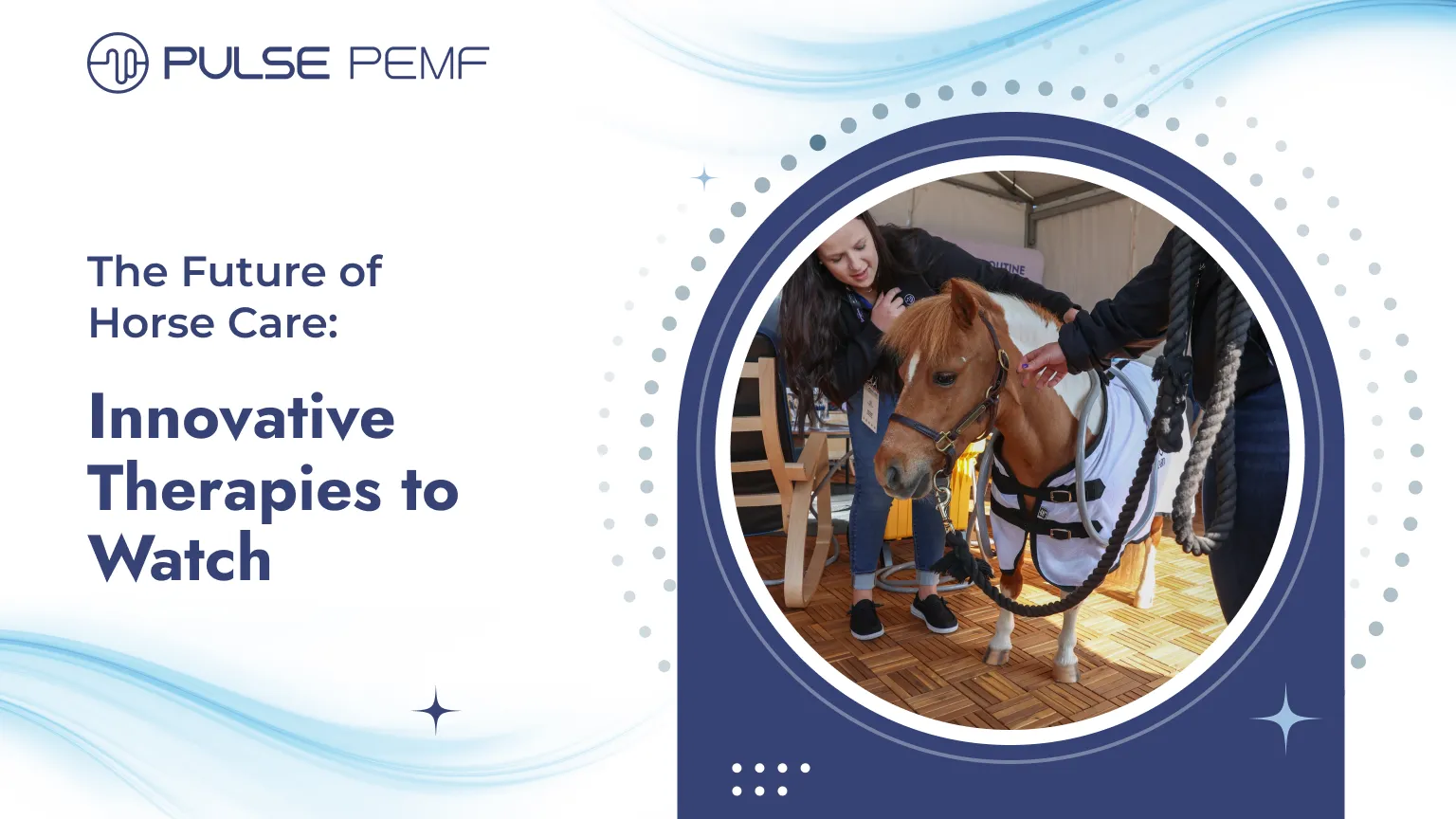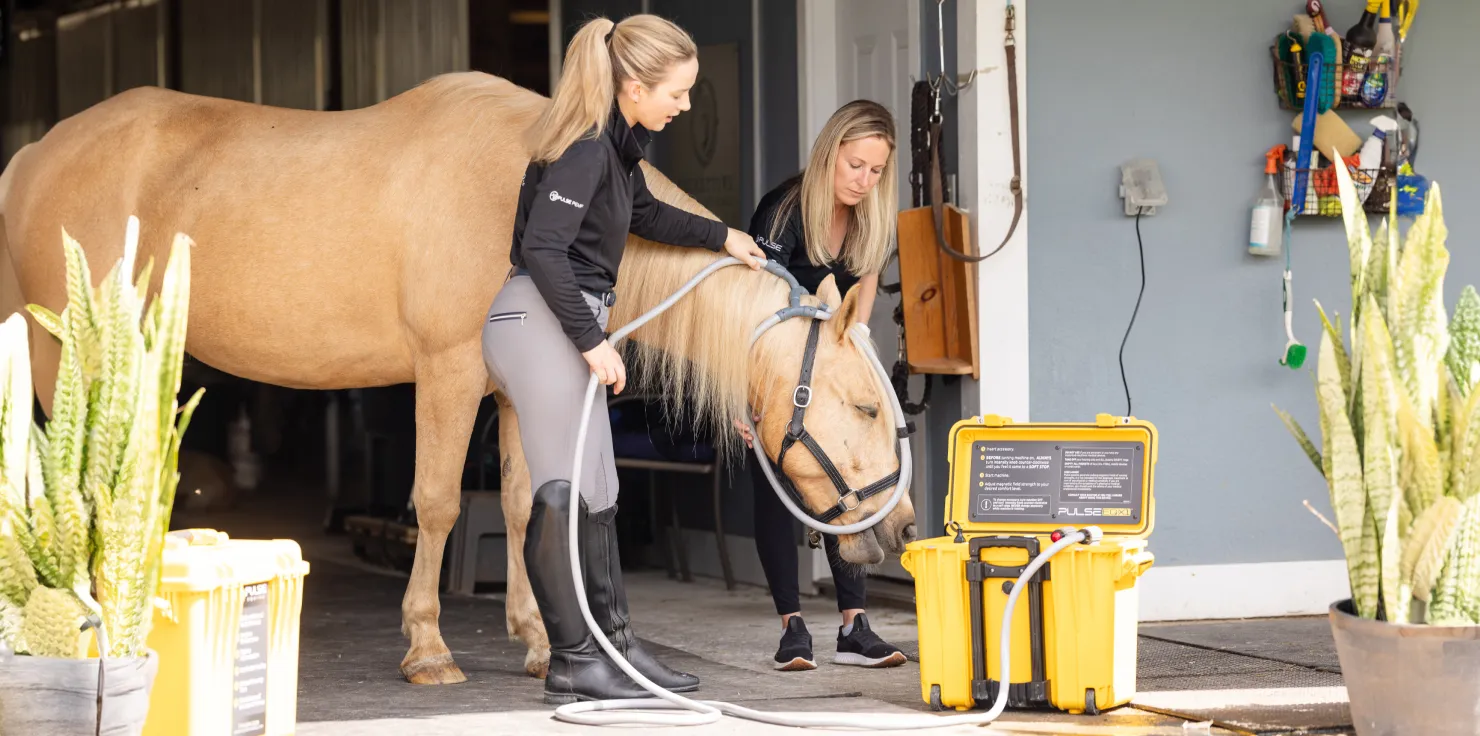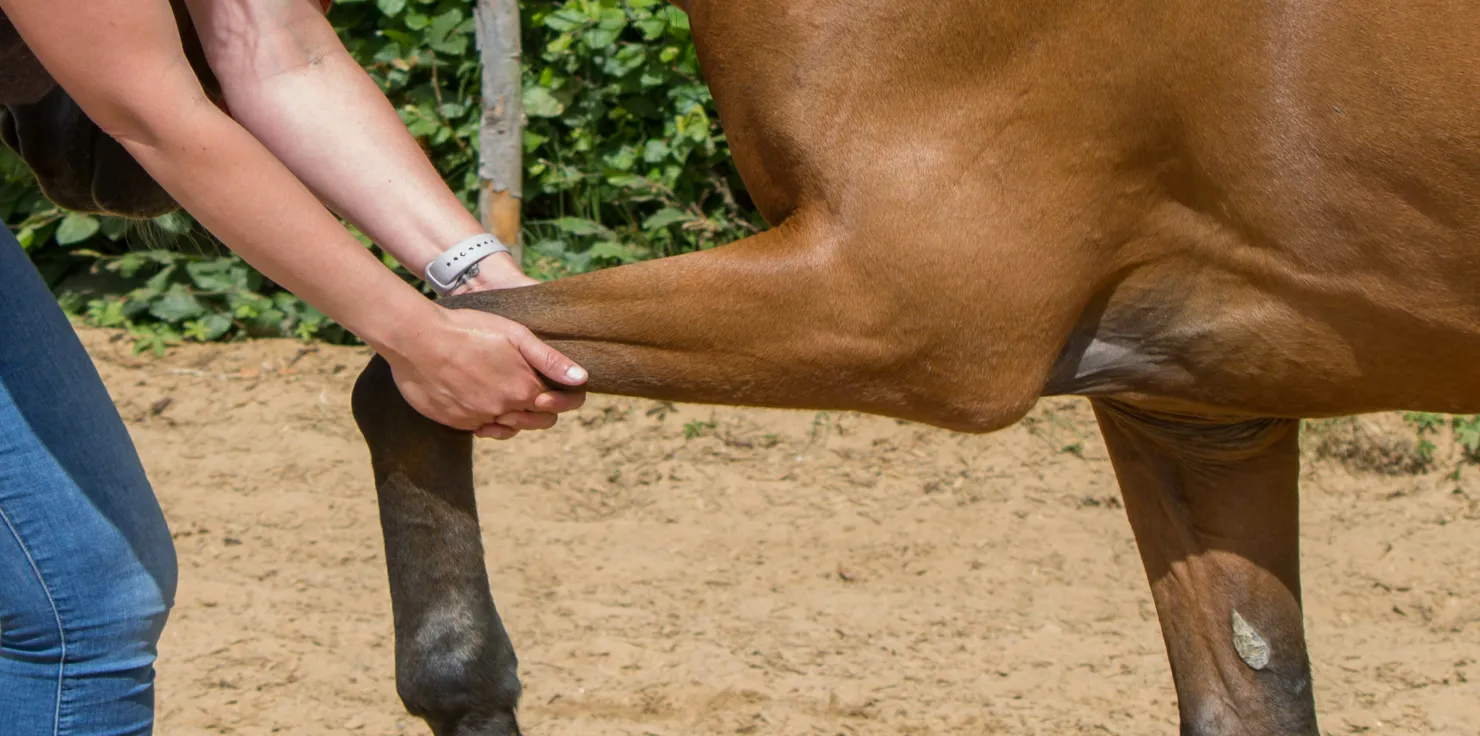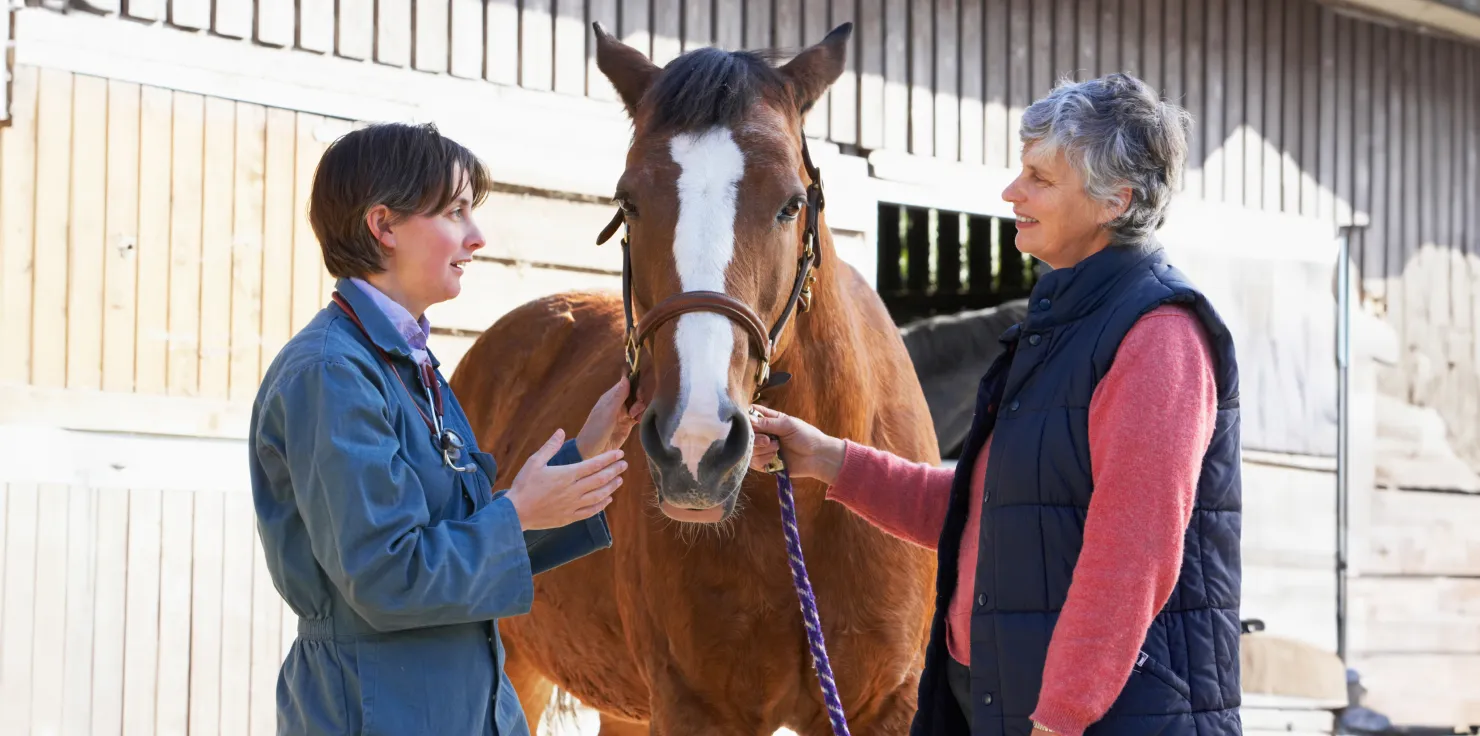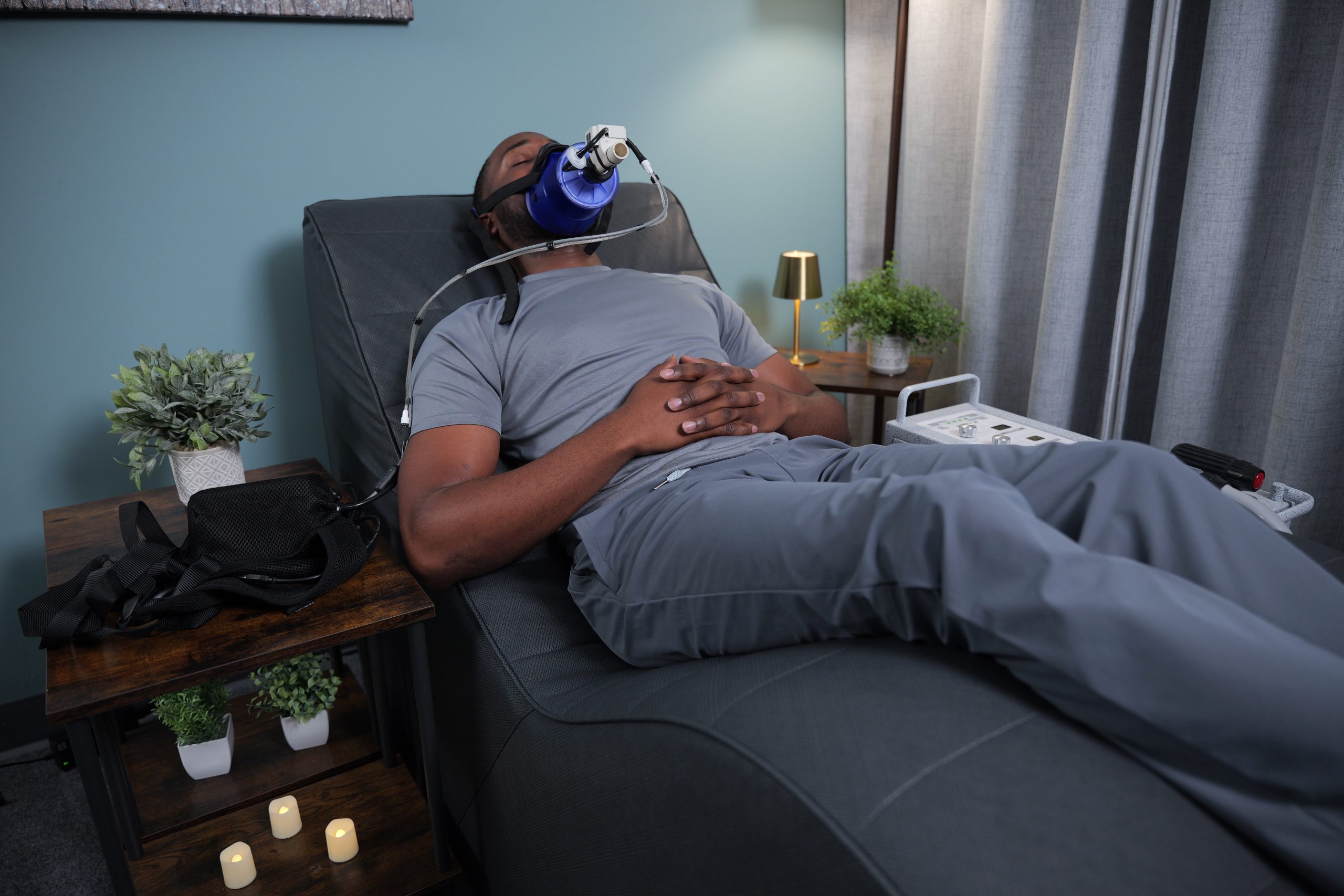The world of horse care is constantly evolving, with innovative therapies emerging all the time. As a horse owner, it’s important to stay informed about these therapies to ensure your horse receives the best possible care.
In this blog post, we’ll highlight some of the most promising therapies that are gaining popularity and shaping the future of horse care, including PEMF therapy!
Understanding the Current Challenges in Horse Care
Horses are beautiful and amazing creatures, but they are also prone to a variety of health issues. These issues can significantly impact their quality of life and performance.
Common Health Issues in Horses
Some of the most common health problems faced by horses include:
- Lameness: This is a general term used to describe pain or discomfort in a horse’s limbs, often caused by conditions like arthritis, tendonitis, or hoof problems.
- Joint Issues: Arthritis and other joint diseases can lead to stiffness, pain, and decreased mobility in horses.
- Respiratory Conditions: Horses can be susceptible to respiratory infections like pneumonia and allergies, which can cause coughing, nasal discharge, and difficulty breathing.
While traditional treatments like medications, therapy, and surgery can be effective in some cases, they can also have limitations. For example, some medications can have side effects, and surgeries may be invasive and require a lengthy recovery period.
The Need for Innovation in Horse Care
The growing demand for more effective and less invasive treatments has led to a surge in innovation in the field of horse care. Technology and science are playing a crucial role in developing therapies that can improve the lives of horses.
As horse owners and enthusiasts, it’s important to stay informed about these innovative technologies and consider how they might benefit your horse’s health and well-being.
Emerging Therapies in Horse Care
The future of horse care is bright, with a range of innovative therapies showing promise in improving equine health and performance. Let’s explore some of the most popular advancements!
PEMF Therapy
PEMF stands for Pulsed Electromagnetic Field Therapy. It involves applying gentle pulses of electromagnetic fields to your horse’s body, stimulating their cells to help them function better overall.
Research suggests PEMF therapy could offer several benefits for horses, including:
Increased range of motion
Enhanced energy levels
Healthy joint and cartilage function
Enhanced relaxation
Optimized overall wellness
PEMF therapy is gaining popularity in horse care due to its non-invasive nature and potential to promote self-healing and recovery at the cellular level.
Learn more about the powerful potential benefits of PEMF for horses here.
Regenerative Medicine
Regenerative medicine utilizes the body’s own healing potential to repair damaged tissues.
Examples include:
- Stem Cell Therapy: Stem cells can differentiate into various cell types, promoting tissue regeneration in areas like tendons and ligaments.
- Platelet-Rich Plasma (PRP): PRP concentrates growth factors from a horse’s own blood, which can accelerate healing after injuries.
Laser Therapy
Laser therapy uses focused beams of light to stimulate healing. It offers potential benefits for wound healing, reducing inflammation, and pain management.
Laser therapy is a versatile tool used in equine practices for treating various conditions, from post-surgical recovery to muscle soreness.
Acupuncture and Acupressure
Derived from Traditional Chinese Medicine, these therapies aim to restore balance in the body’s energy flow.
- Acupuncture: Tiny needles are inserted at specific points on the body to stimulate healing and relieve pain.
- Acupressure: Similar to acupuncture but uses applied pressure instead of needles.
Both show promise in managing equine pain and stress, and can be integrated alongside conventional veterinary treatments.
Hydrotherapy
Hydrotherapy uses water-based treatments for rehabilitation and conditioning. Benefits may include improved circulation, reduced inflammation, and muscle relaxation.
Hydrotherapy facilities offer various treatments, like underwater treadmills and swimming pools, to aid recovery from injuries and surgeries.
Cryotherapy
Cryotherapy, or cold therapy, involves applying extreme cold to reduce inflammation and promote healing.
It may be used for, managing pain, reducing swelling, and aiding recovery. This makes cryotherapy a valuable tool in equine rehabilitation programs.
Chiropractic Care
Chiropractic adjustments focus on the musculoskeletal system, aiming to improve mobility and joint function.
Chiropractic care may benefit horses by:
- Addressing misalignments
- Enhancing overall performance
- Promoting better movement
Many performance horses benefit from regular chiropractic care, potentially improving their comfort and athletic ability.
Probiotics and Gut Health
A healthy gut is essential for overall equine well-being. Probiotics are live bacteria that can support healthy digestion, boost the immune system, and reduce digestive issues.
Supplementation with probiotics can promote gut health in horses, contributing to their overall health and performance.
Nutritional Advancements for Equine Athletes
Nutrition also plays a pivotal role in the performance and recovery of equines. A well-balanced diet provides the essential nutrients horses need for optimal health, energy, and athletic ability.
Customized feeding plans are essential to meet the specific needs of each horse. Factors such as age, breed, workload, and metabolic rate should be considered when determining the appropriate amount and type of feed. Supplements can also be a valuable addition to a horse’s diet, providing targeted nutrients to support various bodily functions.
Consulting with a veterinarian or equine nutritionist can help you develop a tailored feeding plan and determine if supplements are necessary for your horse.
Integrating Emerging Therapies into Your Horse Care Routine
Assessing Your Horse’s Needs
Before incorporating therapies into your horse’s care routine, it’s essential to consult with a veterinarian. They can assess your horse’s specific health conditions, needs, and determine which therapies are most suitable.
Evaluating your horse’s individual situation will help you make informed decisions about their care. Consider factors such as their age, breed, workload, and any existing health issues.
Creating a Comprehensive Care Plan
Combining traditional and emerging therapies can offer a holistic approach to horse care. A comprehensive care plan should:
- Address your horse’s specific needs and goals.
- Incorporate a combination of therapies that complement each other.
- Include regular monitoring and adjustments to ensure the plan remains effective.
By working closely with your veterinarian, you can develop a tailored care plan that optimizes
your horse’s health and well-being.
Educating Owners and Caregivers
Staying informed about innovative therapies is crucial for making informed decisions about your horse’s care. It’s important to:
- Seek out reliable sources of information, such as reputable veterinary websites and journals.
- Attend workshops and seminars to learn about the latest advancements in equine health care.
- Network with other horse owners and caregivers to share knowledge and experiences.
By staying informed, you can make the best possible choices for your horse’s health and ensure they receive the highest quality care.
The Future of Equine Veterinary Medicine
The field of equine veterinary medicine is constantly evolving, with ongoing research and innovations driving advancements in horse care. Researchers are exploring new therapies, diagnostic techniques, and technologies to improve the health and well-being of horses.
By staying informed about these research efforts, horse owners can be at the forefront of equine healthcare and benefit from the latest advancements.
Collaboration and Knowledge Sharing
Collaboration between veterinarians, researchers, and horse owners is essential for driving progress in equine veterinary medicine. By sharing experiences, knowledge, and resources, we can collectively advance our understanding of equine health and develop more effective treatment strategies.
Platforms and communities for sharing information include:
- Online forums and discussion groups: These platforms provide opportunities to connect with other horse owners and veterinarians.
- Veterinary conferences and workshops: Attending these events can help you stay updated on the latest research and innovations.
- Social media: Following veterinary professionals and equine organizations on social media can provide valuable insights and information.
By actively participating in these communities, you can contribute to the advancement of equine veterinary medicine and ensure your horse receives the best possible care.
Conclusion
The future of horse care is incredibly exciting, with a vast array of therapies and innovative approaches on the horizon. By staying informed about these advancements, you can ensure your horse receives the best possible care and leads a long, healthy, and fulfilling life.
Looking to learn more? Visit our website to learn more about the innovative technology of PEMF therapy and its potential benefits for horse care!

